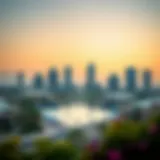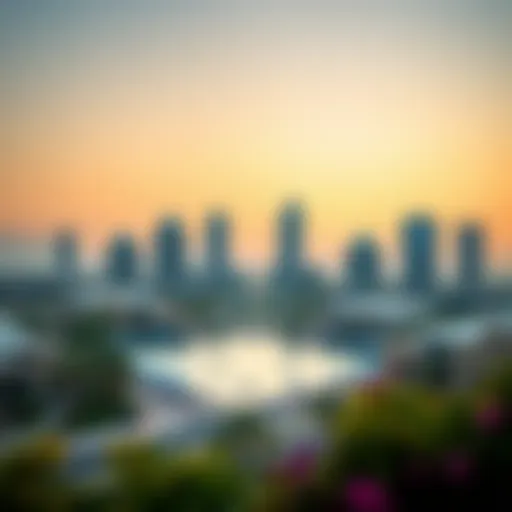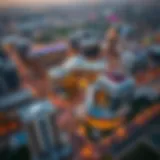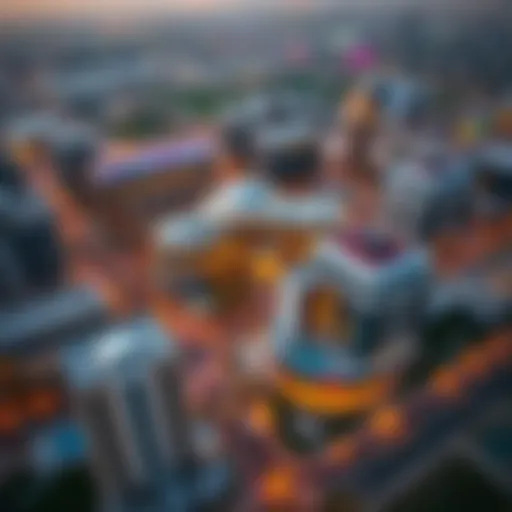Eid ul-Fitr 2023 Prayer Times in Dubai
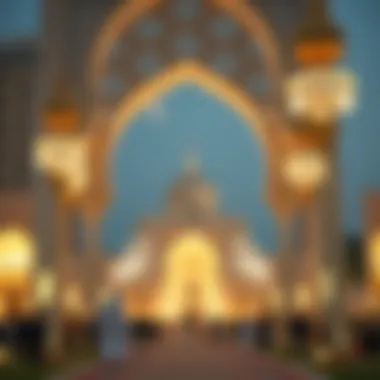

Intro
Eid ul-Fitr, the festival marking the end of Ramadan, resonates deeply within the hearts of Muslims around the globe. In 2023, Dubai is set to celebrate this joyous occasion with all its cultural vibrancy and communal spirit. The essence of Eid lies not merely in its rituals, but in the collective experience, as friends and families come together to engage in prayer, share meals, and extend good wishes. This article will walk you through key aspects of the upcoming celebration, particularly focusing on prayer times, significant locations, and insights into community practices that enrich this spiritual occasion.
One might wonder why prayer times take on such importance during this festival. The communal prayers conducted after Eid morning signify unity and gratitude, fostering a sense of belonging among participants. This guide aims to serve as a robust source of information for residents and visitors alike, preparing them for the unique celebrations in the ever-evolving cultural landscape of Dubai.
Understanding the framework of prayer times, their significance, and the locations where these rituals will unfold is essential for anyone looking to immerse themselves fully in this significant observance. With this comprehensive overview, readers will be geared up to engage meaningfully with one of the most important celebrations in the Islamic calendar.
As we explore these facets of Eid ul-Fitr in Dubai, we will also touch upon how this occasion reflects the broader tapestry of life in the city, emphasizing spiritual observance amidst the fast-paced urban environment.
Prelude to Eid ul-Fitr
Eid ul-Fitr marks the conclusion of Ramadan, the holy month of fasting for Muslims. It is a time of joy, reflection, and gratitude as believers celebrate the end of a period dedicated to spiritual growth and self-discipline. For residents and visitors in Dubai, understanding the significance of Eid ul-Fitr isn’t just about marking the calendar; it’s about participating in a rich cultural tradition that blends faith with community.
As one of the most significant religious celebrations for Muslims, Eid ul-Fitr initiates a series of communal prayers, feasting, and charitable acts. The importance of this celebration goes beyond mere rituals; it encapsulates the essence of unity, compassion, and shared values among communities. In a cosmopolitan city like Dubai, appreciating the layers of this celebration can foster a deeper understanding of local customs and enhance the experiences of expatriates and tourists alike.
This article serves as a comprehensive guide, detailing the prayer times and cultural context of Eid ul-Fitr 2023 in Dubai. It aims to equip readers with essential information, ensuring that they are well-prepared to engage with the festivities. These insights will not only enhance individual observance of the holiday but will also facilitate greater community interaction, as the act of coming together during Eid is foundational to its spirit.
"Eid ul-Fitr is a time to express gratitude for the strength shown during Ramadan, nurturing bonds with family and friends."
In summary, knowing when and where the prayers take place empowers worshippers to partake fully in these heartfelt observances, making them an integral part of the larger narrative of community living in Dubai.
Overview of Ramadan
Understanding Ramadan is crucial for grasping the full significance of Eid ul-Fitr and the communal atmosphere it fosters. This holy month serves as a time for reflection, spiritual growth, and deepening one's connection with faith. The practices during Ramadan prepare both the body and soul for the celebrations that follow.
Understanding the Month of Fasting
Ramadan is not just about abstaining from food and drink from dawn till dusk; it embodies a deeper spiritual purpose. The act of fasting acts like a reset button for Muslims, encouraging self-discipline and mindfulness. To many, it feels as if the constraints of the outside world momentarily slip away, enabling a focus on internal thoughts and feelings.
During this month, families often come together to break their fast with a meal known as iftar. These gatherings are a chance to strengthen bonds and share stories. Local flavors often shine bright at the dinner tables, showcasing a mouth-watering array of dishes that can be found in Dubai. For instance, breaking the fast with dates and water may seem simple, but it embodies the spirit of the occasion.
Additionally, the significance of prayer cannot be overstated. Increased devotion through prayer and recitation of the Quran emphasizes a collective yearning for spiritual growth. Mosques enliven with worshippers, creating an environment that is both uplifting and welcoming. This month reminds not only of personal faith but also of community strength in adhering to common beliefs.
Spiritual Practices During Ramadan
Spiritual practices during Ramadan extend beyond fasting and include charitable deeds and self-reflection. Many individuals take it upon themselves to offer assistance to those who are less fortunate, embodying the spirit of Zakat, which is an obligatory form of almsgiving. This aligns with the values of compassion and generosity that are central to Islamic teachings. The practice of giving not only helps the needy but also serves as a reminder of the blessings one possesses.
“Charity does not decrease wealth.”
This saying resonates deeply throughout the month as many view giving as an act of spiritual purification. The act of sharing, whether through food or resources, unites communities and fosters a spirit of togetherness. Moreover, group prayers become more common, encouraging unity among people of diverse backgrounds in Dubai's cosmopolitan milieu.
As the month winds down, reflection becomes critical. Individuals contemplate their virtues and shortcomings and set intentions for the future. This introspective journey adds depth to the celebrations of Eid al-Fitr, bridging a personal journey with communal revelry. It contributes to a broader understanding of one’s identity and role within the society.
Ultimately, the essence of Ramadan lies in shaping a lifestyle. It reaches beyond thirty days of fasting; it plants the seeds of mindfulness, generosity, and community spirit that can flourish throughout the entire year.
Eid ul-Fitr Prayer Times in Dubai
Eid ul-Fitr marks the end of Ramadan, bringing a sense of joy and reflection to the community. In Dubai, the prayer times for this occasion hold significant importance, allowing residents and visitors alike to partake in this cherished tradition. Understanding these timing nuances not only aids in planning for the day but also enhances the spiritual experience. Knowing when and where to pray fosters a sense of community and unity among Muslims within the city.
Official Prayer Timings for
For the year 2023, the official prayer timings for Eid ul-Fitr in Dubai are anticipated to fall on the morning of April 21. Typically, the prayer occurs shortly after the sun has risen, often around 6:00 AM. The precise time may vary slightly depending on the specific location within the emirate. It is advisable for attendees to arrive early to secure a spot and engage in the preparatory rituals that accompany this sacred gathering.
Some local mosques and prayer grounds, such as the Grand Mosque and Sheikh Zayed Mosque, are expected to attract large crowds, so it is essential to be mindful of potential delays and to account for traffic. Additionally, for those unfamiliar with the area, using local navigation apps can provide accurate directions and real-time updates to avoid congestion.
Variation in Prayer Times Across the City
It's important to note that prayer times can differ slightly from one area to another within Dubai. These variations are typically influenced by the geographical positioning of mosques and prayer grounds. Here's a brief overview of how these differences manifest:
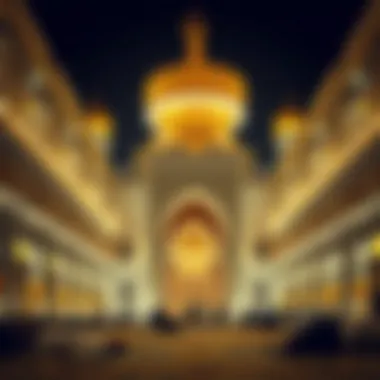

- West Dubai: Prayer is generally a bit earlier due to its proximity to the Arabian Gulf. Typical timings here hover around 5:50 AM.
- Central Dubai: Locations like Downtown Dubai may follow the standard time around 6:00 AM, aligning with most central mosques.
- East Dubai: Areas further inland may observe prayer later, commonly starting at 6:10 AM.
To ensure that one is aligning with the correct timing, checking local news outlets or mosque announcements close to the date can be greatly beneficial. Furthermore, utilizing platforms such as IslamicFinder can provide the most up-to-date information on prayer timings tailored to specific locations within the city.
As Eid approaches, the peaceful atmosphere of Dubai transforms as people prepare to celebrate together, making the synchronized act of prayer a keystone to the community’s spiritual renewal.
Locations for Eid Prayer in Dubai
Eid ul-Fitr is not just a day of celebration; it transforms Dubai into a vibrant tapestry of faith and community. Choosing the right prayer location is crucial for anyone looking to partake in the festivities. With many places designated for prayers, knowing where to go can enhance the experience, deepen one's connection to the community, and ensure attendance at one of the most significant spiritual gatherings of the year.
Popular Mosques and Prayer Grounds
Dubai boasts an array of mosques and outdoor prayer grounds, each offering a unique ambiance for observing the Eid prayer. Major mosques such as the Jumeirah Mosque and the Sheikh Zayed Road Mosque are just a few examples where a large turnout is expected. These mosques hold a special significance in the hearts of residents, both local and expatriate.
The famous Grand Mosque in Bur Dubai is another notable location. It’s not only a beautiful landmark but can also accommodate thousands of worshippers. This mosque sees a diverse crowd during Eid, bringing together people from various backgrounds, fostering a sense of unity and togetherness amongst attendees.
Here are some well-known prayer sites:
- Jumeirah Mosque: An architectural beauty attracting many.
- Sheikh Zayed Road Mosque: Convenient for those working in the city center.
- Al Farooq Omar Bin Al Khattab Mosque: Holds rich history and large gatherings.
For those seeking a more optimistic atmosphere, the Burj Park near the iconic Burj Khalifa transforms into a focal point for community prayers. Each site not only accommodates large crowds but offers arrangements for families and individuals, ensuring everyone has a space to participate.
Community and Square Gatherings
Besides mosques, Dubai embraces community and square gatherings during Eid, where multidimensional festivities unfold. Parks and public squares become vibrant hubs for people coming together—music, food, and the festive spirit fill the air. These gatherings provide a unique opportunity to mingle with different cultures, share joy, and partake in various community-led events.
In prominent areas such as Dubai Marina and Downtown Dubai, open gatherings are quite popular, allowing both families and single attendees to come together. These clearings often include food stalls, cultural exhibits, and activities for children. It’s an occasion where residents can feel the warmth of camaraderie, even among strangers, emphasizing the core essence of Eid as a time for giving and sharing.
These gatherings offer something for everyone:
- Activities for Kids: From puppet shows to face painting.
- Cultural Exhibitions: Showcasing the rich tapestry of traditions and foods from different backgrounds.
- Cuisine Sampling: Visitors can enjoy various types of traditional dishes, reflecting Dubai’s multicultural landscape.
All these elements reinforce the strong community bond that Dubai fosters, emphasizing how deeply rooted the values of friendship and generosity are during Eid ul-Fitr. Residents and expatriates alike can take part in the rituals, ensuring no one is left behind in the celebration.
“In a world that can often feel divided, occasions like Eid create a space for unity and shared joy.”
As the sun rises on the day of Eid, looking forward to attending either a mosque or a community gathering not only fulfills religious obligations but also strengthens ties within the spirit of Dubai’s diverse population.
Understanding the Rituals of Eid al-Fitr
Eid al-Fitr is not just a date on the calendar; it’s a rite of passage for many Muslims around the globe, marking the end of Ramadan. Understanding the rituals associated with this festive occasion brings to light the cultural fabric that binds communities in Dubai and beyond. The significance of the rituals goes beyond mere tradition; it reflects deep spiritual meaning, showcasing unity, gratitude, and social responsibility, which are intrinsic to Islamic beliefs.
The Significance of the Eid Prayer
The Eid prayer, performed in the morning on the day of Eid, holds enormous weight in the Islamic faith. In Dubai, thousands of worshippers gather at mosques and designated prayer grounds to participate. This congregation signifies more than just the act of praying; it represents a collective expression of faith and devotion. The prayer itself is unique in its structure; it typically consists of two units, or rakats, accompanied by a sermon, known as the Khutbah. This sermon serves to remind attendees about the virtues of charity and humility, reinforcing the lessons learned during the fasting month of Ramadan.
Key Elements of the Eid Prayer:
- Unity: The gathering fosters a sense of togetherness, reminding individuals that they are part of a larger community.
- Gratitude: It is an occasion to thank Allah for the strength to complete Ramadan and for the blessings that have been bestowed.
- Reflection: It encourages introspection about personal growth and spiritual aspirations.
Attending the Eid prayer is often considered a communal obligation, making it vital for the sense of belonging among participants. Many expats and residents find their spiritual home in these gatherings, even if far from their countries of origin.
Acts of Charity and Zakat al-Fitr
One of the most distinguishing aspects of Eid al-Fitr is the emphasis on charity, specifically through the practice of Zakat al-Fitr. This form of charity is obligatory and is intended to purify the fast and ensure that everyone, regardless of their economic situation, has the means to partake in the celebration. The act of giving wealth to those in need embodies the spirit of compassion, underscoring community solidarity and mutual support.
Understanding Zakat al-Fitr:
- Obligatory Donation: Each Muslim is required to give a set amount to those in need, typically before the Eid prayer.
- Facilitating Joy: The funds collected are used to provide food and necessities to the underprivileged, allowing them to celebrate Eid with dignity.
- Culmination of Ramadan’s Teachings: It symbolizes the culmination of the month-long fasting period, where self-restraint gradually transforms into generosity.
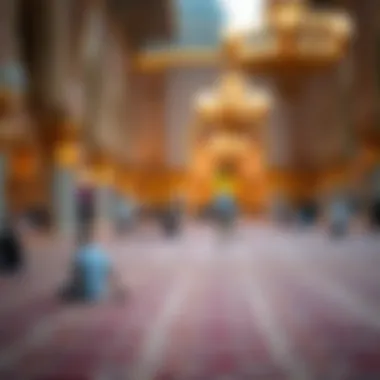

It’s a time when families come together not just to celebrate but also to reflect on their responsibilities towards the less fortunate. As a melting pot of cultures, Dubai showcases various charitable initiatives, often putting forth their best effort to assist local communities.
"In giving, we are often given back tenfold; helping others enriches our own lives in ways we may not foresee."
The importance of understanding these rituals lies in their potential to promote awareness and engagement within both local and expatriate communities in Dubai. Embracing these elements helps individuals appreciate not only the festive spirit but also the underlying values that contribute to a cohesive society.
Community Participation During Eid
Eid ul-Fitr transcends mere rituals; it embodies a spirit of togetherness that binds communities. This section delves into the essence of community participation during Eid, explaining its critical elements and the palpable benefits that arise from collective observance.
Fostering Connections
When the curtains of Ramadan draw to a close, the vibrant pulse of community engagement comes alive. Families and friends gather not only for prayers but also to share meals and good tidings. This social interaction strengthens ties among residents, which is particularly significant in a cosmopolitan hub like Dubai. Notably, community activities during this festive time extend beyond the religious gatherings at mosques, reaching into streets and parks where families come together to celebrate.
- Communicating Traditions: In Dubai, the exchange of Eid greetings and customary practices such as giving gifts contributes to maintaining a rich cultural heritage. It also provides an avenue for expatriates to integrate and understand the local customs.
- Volunteerism: Local organizations often mobilize volunteers to assist with food drives and charity events. This solidarity enhances the sense of belonging and collective responsibility. Everyone, regardless of their background, often finds a role to play, making the festivities inclusive and enriching.
Role of Local Organizations
Local organizations in Dubai play a pivotal role during Eid, harmonizing efforts that ensure a smooth and joyous celebration for all. Whether they are cultural groups, non-profits, or religious institutions, their contributions are invaluable.
Organized Activities and Gatherings
Many organizations arrange communal prayers, ensuring that large groups can participate safely and comfortably. They also promote various activities that encourage families to come together. For instance, events might include public iftars, art exhibitions, and youth programs designed to engage young people in meaningful ways.
- Caters to Diverse Populations: As Dubai is home to expatriates from around the globe, local organizations often adapt their work to include different cultural perspectives. This inclusivity makes Eid more accessible and cohesive.
"Inclusiveness is key. The essence of Eid should resonate with every soul, whether a local or a newcomer. By embracing diversity, we nurture community spirit during these cherished days."
Events and Festivities
Eid ul-Fitr in Dubai is a festival overflowing with events that celebrate the end of Ramadan. This joyful season is marked by various festivities that cater to all ages and backgrounds.
Marketplaces and Evening Celebrations
The cultural landscape of Dubai transforms into lively markets showcasing traditional foods, crafts, and gifts. Families flock to these markets to soak up the festive ambiance, enjoying local delicacies such as maamoul and knafeh.
- Fireworks and Concerts: Many public places host stunning firework displays that culminate the celebrations. Concerts featuring local and international artists often take center stage, offering entertainment which brings people together under the night sky.
- Family-Friendly Activities: Parks and community centers plan day-long events including games, crafts, and performances for families, inviting merriment for young and old alike. Such initiatives foster a sense of joy and community pride.
Eid ul-Fitr and Real Estate in Dubai
Eid ul-Fitr isn't just a time for celebration; it holds significant implications for the real estate sector in Dubai. As the festival approaches, many individuals and families audience start to consider their housing needs, whether it's for personal use or investment. Given the city's dynamic property market, understanding how Eid influences this landscape can offer valuable insights for investors, expatriates, and homeowners seeking to navigate this vibrant environment.
The cultural joys of Eid translate into localized economic activities, notably affecting the bustling real estate sector. Traditionally, during this festive period, there is an uptick in housing transactions and rental inquiries. Many expatriates often look to secure temporary accommodations for visiting family members, while others might wish to invest in properties in anticipation of long-term gains, driven by the cultural significance attached to the holiday.
Moreover, this is particularly relevant in Dubai, where social gatherings and family reunions are commonplace during Eid. Properties that cater to such gatherings, whether they be spacious villas or well-located apartments, often see a spike in demand. The emotional aspect of the festival influences buying patterns, as families often prioritize homes that offer both comfort and space for communal festivities.
Impact on Property Market Activity
During Eid, the real estate market tends to experience increased activity. A noticeable surge in inquiries for both rental and sale properties occurs as people prepare for the festivities. Many venture out to explore neighborhoods that are lively and vibrant, seeking properties that not only serve as a festive base but also promise long-term enjoyment.
"Eid ul-Fitr brings a unique perspective to the property market, as the demand is typically influenced by family-centric needs during this time."
This seasonality is crucial for property developers and real estate agents. They often adjust their marketing strategies to focus on larger homes with facilities suitable for family gatherings. Additionally, promotional campaigns around Eid can further entice buyers who may be on the fence about making a decision.
Residential Trends During the Festivities
Eid’s arrival often brings about unique trends in the residential market that reflect the spirit of the season. Firstly, many families prefer properties that are located near central areas where communal prayers and celebrations are orchestrated. Areas that facilitate easy access to mosques and community centers tend to flourish.
Another trend observed is the rise in short-term rental listings. Platforms such as Airbnb see a greater influx of listings as homeowners capitalize on the demand from those traveling to Dubai for the celebrations. The short-term rental market can become quite competitive during this time as individuals and families flock to the city.
In addition, properties with enhanced amenities, such as larger kitchens or outdoor spaces, become highly desirable as families prepare for Eid meals and gatherings. Buyers and renters alike have an eye for homes that allow them to host and celebrate effectively.
Understanding these trends is vital for potential investors. Identifying properties that align with these festive needs can yield fruitful returns, making it an opportune moment for savvy investors to capture the market's seasonal pulse.
How to Prepare for Eid ul-Fitr
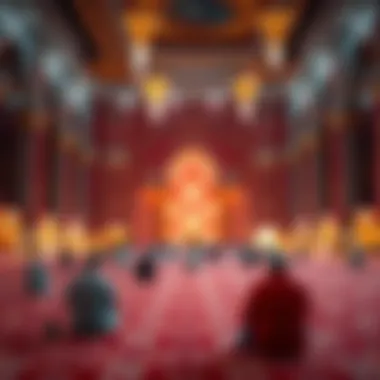

Preparing for Eid ul-Fitr is not just a matter of getting your home ready or buying new clothes, though those elements play a significant role. This time of year is about coming together as a community and transitioning from the spiritual discipline of Ramadan to the joyous celebration of Eid. Understanding how to prepare properly can enhance the overall experience, reflecting both personal and communal values.
Shopping and Holiday Preparations
Shopping for Eid involves more than picking up a few groceries. It’s a time to buy gifts for loved ones, new outfits to mark the occasion, and special foods that are often unique to the festivities. Many families set aside a set budget for these purchases to ensure they can celebrate without financial stress.
- Clothes: Traditionally, buying new clothes for Eid is common. For many, it’s an expression of joy to wear something fresh that symbolizes new beginnings. Popular stores in Dubai like Mall of the Emirates and The Dubai Mall offer a wide range of choices from local boutiques to international brands, catering to all tastes and budgets.
- Gifts: Exchanging gifts is a beautiful way to spread joy. Items such as sweets, small electronics, or items for the home are favored. Consider personalized gifts, like custom-made items, they offer a more heartfelt touch.
- Food Preparation: Food is at the heart of Eid celebrations. Families often prepare traditional dishes such as Biryani or Harees, along with an array of sweets like Baklava and Knafeh. It may also be beneficial to plan ahead and list the ingredients required to avoid last-minute dashes to the market.
Personal Reflection and Community Engagement
Eid ul-Fitr is not solely about physical preparations; it’s equally about spiritual readiness. Taking time for personal reflection during the last days of Ramadan can enhance one’s commitment to the spiritual side of Eid.
- Reflecting on Ramadan: Think back on the past month. Consider how the practices of fasting and prayer have impacted your life. This reflection can lead to a more profound appreciation for the significance of Eid. Write down thoughts in a journal, which also helps clarify intentions for the future.
- Engagement in Community Service: Part of the Eid tradition includes Zakat al-Fitr, which is a form of charity given to those in need before the Eid prayer. Engaging in community service or supporting local charities in Dubai ensures that the joy of Eid is shared.
"Eid is not just a celebration, it's a reminder of the bonds we have with our family and community. Preparation is both personal and communal."
Planning activities to engage with neighbors and community members can also create a richer festive atmosphere. Setting up gatherings, helping with communal prayers, or simply sharing meals can strengthen bonds and foster a greater sense of togetherness during this important time.
Eid ul-Fitr Traditions in Dubai
Eid ul-Fitr is not just a conclusion to Ramadan; it’s a vibrant tapestry of tradition, culture, and community spirit within Dubai. For those residing in or visiting this dynamic city, understanding the local customs can enrich the experience of this significant holiday. From the feast that breaks the fast to the exchange of heartfelt gifts, all these elements intertwine to create a unique flavor of Eid that resonates with everyone.
Food and Festivities
When the sun rises on Eid ul-Fitr, it heralds a day filled with joy and abundant feasting. Families come together for lavish breakfasts after a month of fasting, reflecting a sense of togetherness and gratitude. Traditional dishes emerge, showcasing the rich culinary heritage that Dubai boasts.
Common highlights on the dining table include the beloved sheer khurma, a sweet vermicelli dish cooked with milk and dry fruits, symbolizing sweetness in life. Likewise, the iconic kabsa, a mixed rice dish with spiced meat, is often prepared, embodying the flavors of the region. A myriad of desserts follows suit, with maamoul (date-filled pastries) being a sweet treat that never fails to impress.
Yet, Eid is not merely about food; it’s a chance to engage in festivities that unite communities. Public spaces in Dubai often transform into celebration grounds, featuring dazzling decorations, live music, and entertainment for all ages. This time of year sees neighborhoods pulse with a renewed energy, as families flood parks and malls, basking in the spirit of giving and camaraderie.
"Eid ul-Fitr is the perfect occasion to not only indulge in cherished dishes but also to bridge gaps and forge connections in this multicultural melting pot."
Gifts and Community Sharing
Gifting during Eid ul-Fitr carries significant weight and meaning. It’s customary for families to present gifts to their loved ones, a practice rooted deeply in the spirit of sharing and generosity. Often, children receive Eidi, which are cash gifts or presents, filling the atmosphere with excitement and anticipation.
In Dubai, this culture of giving extends to those less fortunate, emphasizing the value of charity ingrained within Islamic teachings. Many opt to pay their Zakat al-Fitr before Eid prayers, ensuring that even the needy partake in the celebrations. Community initiatives encourage donations and support for local charities, reinforcing bonds among residents.
Engagement in these traditions is not just a ritual; it’s a profound expression of unity. With a diverse expatriate population, Dubai’s approach to Eid ul-Fitr reflects a harmonious blend of customs from across the globe, showcasing how the simple act of giving can transcend cultural barriers.
Closure
Eid ul-Fitr holds immense significance not just as a religious observance, but also as a social and cultural event that reflects the values and traditions of the Muslim community in Dubai. Through the exploration of the various aspects segmented throughout this article, we understand how essential it is for both residents and expatriates to engage in the festivities, making thoughtful preparations that embrace the spirit of Eid. The prayers, communal gatherings, charity, and family time intertwine, creating a tapestry of joy and connection.
Reflections on Eid ul-Fitr
Eid ul-Fitr isn't merely a date on the calendar; it's a time when individuals pause to reflect on their spiritual growth during Ramadan. People often find solace in the prayer sessions, as they gather with family and friends to celebrate the end of fasting. It’s an opportunity to look inward and assess the changes that might have taken place throughout the month.
Many families in Dubai begin their Eid celebrations with morning prayers, distinctively formatted to encourage unity. After the prayers, there’s an ethereal feeling in the air, as joyous greetings, laughter, and embraces punctuate the day. The essence of community shines through when folks from diverse backgrounds share a meal together, ensuring everyone feels included.
Ultimately, Eid ul-Fitr is a chance to recommit oneself to values of compassion and gratitude. As attendees rejoice in blessings, it’s a reminder that these moments serve as nourishment for the soul.
Looking Ahead to Future Celebrations
The prospect of future Eid celebrations in Dubai is promising, especially with the ever-evolving landscape of the city. As it continues to grow, one can expect increased participation from different cultural backgrounds, allowing for a more vibrant fusion of traditions. The integration of technology has already begun shaping how people prepare for Eid—smartphone applications that provide prayer times, recipes, and gift ideas are becoming integral.
Moreover, local communities will likely enhance their engagement, creating events that celebrate diversity. Marketplaces filled with unique Eid offerings will grow, providing opportunities for local vendors and encouraging small businesses. This trend not only fosters economic vitality but also establishes relationships between residents and entrepreneurs.
As we reflect on the festive traditions that accompany Eid ul-Fitr, the inescapable truth is that it's a celebration that transcends boundaries, merging the sacred and the social. By keeping these moments in mind, future Eid celebrations can only become more inclusive, more joyful, and more profound.
“Eid ul-Fitr is not just about the rituals; it's about community, love, and shared experiences.”
Overall, whether one is a long-term resident or a newcomer, participating in successive Eid ul-Fitr festivities will be a continuous opportunity for renewal, connection, and learning within the heart of Dubai.
For additional information, you can visit Dubai's official tourism site.




